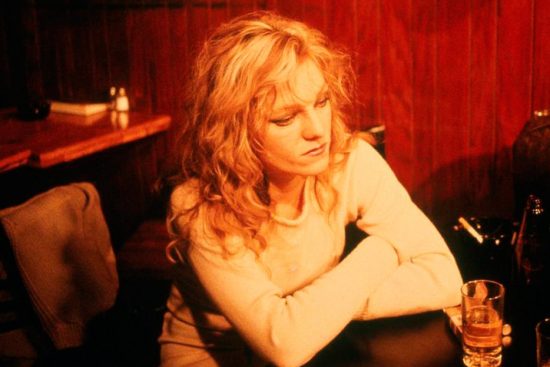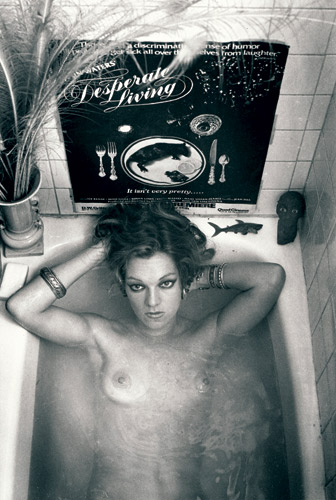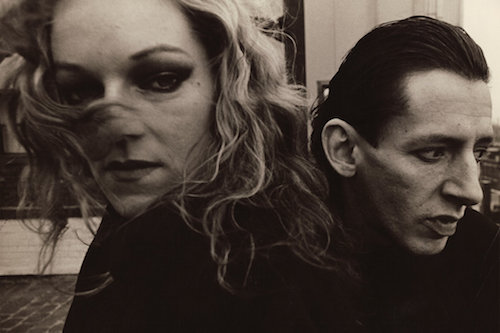IMAGINARY FRIENDS (1)
By:
July 30, 2017
One in a series of ten posts reprinting HILOBROW friend Alexandra Molotkow’s profiles of figures who’ve loomed large in her personal pantheon.

“A woman… knows instinctively that the only wrong is to hurt others, and that the meaning of life is love.” The woman who wrote these words was an attempted murderer, but that doesn’t make them any less true. If you boil it way down there is one big right and one big wrong, which leaves many possibilities for joy.
Cookie Mueller was born in March 1949. She grew up in Baltimore. At 15, she teased her hair until it scraped the ceiling and clomped down the halls of her high school in spike heels and cone bras. She dated a boy who was in and out of jail, and a girl she described as “born of a lightbulb, it seemed,” whose “scalp shone through all the teasing as if her head was a mango.” In her diary, Cookie wrote, “The living hold life/to a minimum of existence/but are still afraid of death.”
She arrived in Haight-Ashbury in time for the Summer of Love, where she encountered Janis Joplin, Jimi Hendrix, and Anton LaVey. She did acid until her roommates had her institutionalized. After being transferred to a hospital in Maryland, she met John Waters at the premiere for Mondo Trasho. She’d appear in five of his movies: dancing topless to “Jailhouse Rock” in Multiple Maniacs, brandishing a flogger in Desperate Living, getting fucked by a chicken in Pink Flamingoes.

In Baltimore, she lived in a crowded, three-room basement with a pet monkey who ate cockroaches. In Provincetown, according to a friend, she’d wear a monkey-fur coat to pick up the welfare check. She travelled the world with her longtime girlfriend, Sharon Niesp, and her young son, Max, whose father was a Provincetown person she’d danced with at Piggy’s, the town disco. “She wanted my sperm,” he told biographer Chloe Griffin. “And she got it and we got Max.”
Cookie landed in Lower Manhattan, where she became, in Nan Goldin’s words, “sort of the queen of the whole downtown social scene.” She’s remembered as vibrantly empathetic, a rare combination of character and friend. She wrote a “health in the face of drug use” advice column for the East Village Eye, and an arts column for Details. She go-go danced and sold MDA, which, according to a commenter on Motherboards NYC, customers referred to as a Master’s Degree in Art.
John Waters remembers her snorting instant coffee because she “didn’t have time to make it the normal way.” She claimed that every morning, no matter how bad the hangover, she rose with the dawn to make Max breakfast and get him to school. Her friend Pat Burgee told Griffin, “It was a Cookie style of mothering and it wouldn’t have been anything that any mother at the time would have recognized as appropriate. But it was far more appropriate between the two of them than other people realized.”
She recorded her life in her columns and in short, mostly autobiographical stories. She was a good writer, with great stories to tell but also chops: she pictured John Water as a “tiny baby, fully developed and compact like a pound cake, almost bursting his bunting wrapper with the desire to communicate to anybody who’d listen.” The New York summer heat is “served as thick as lava gravy,” and “closing in like the lid of a waffle iron.”
Cookie Mueller had good, solid values, adapted for a life that careened like a unicycle down a fire escape. She was the kind of person who seems to live adjacent to everyone else, subject to different rules and different laws of cause and effect. Adventure just accrued to her, like money, or lovers, do for some. “I’m not wild,” she wrote. “I happen to stumble onto wildness. It gets in my path.” And she was lucky, in her way: in Sicily, she rented a car, totaled the roof, then returned it to an inspector too short to notice the damage. In Elkton, Maryland, she was kidnapped by gun-wielding hillbillies and raped. She escaped by hiding in the woods under the lining of her black velvet jacket. You picture her losing an arm, then tossing it into the icebox as she fishes out a beer.

Cookie learned about AIDS a year before it received its name, from a New York Times item she read aloud to friends on Fire Island. “Perhaps there is no hope left for the whole of humankind,” she wrote later, “not because of the nature of the epidemic, but the nature of those it strikes.” In her East Village Eye column — in which she improvised remedies with the certainty of a pediatrician — she urged her readers not to worry; she once prescribed an enema to a friend whose appendix was about to burst. In an interview with Chloé Griffin, David Armstrong remembered that she “was always doing some crazy diet” toward the end of her life. “I mean, at that point it just seemed to me that she was evading what she knew to be true.”
In early 1989, her husband, the artist Vittorio Scarpati, was hospitalized with two collapsed lungs. She wrote about his work in her Details column, ending with, “I hope he comes home soon.” He died in September, 1989. Nan Goldin photographed Cookie at his funeral, and, several weeks later, in her casket. A friend remembered going through her clothes after her death, and finding that outfits that had looked dazzling on her were held together with safety pins and tape.
If you think of a work as a series of decisions, aligned to a sensibility, the same genius that makes a story can make a life. Cookie Mueller had a skill for living extraordinarily and an equal skill for self-expression. She was a character, for John Waters, for Nan Goldin, but she had the genius to serve her sensibility, and that’s another way she was lucky. Her genius runs counter to what we expect of genius: Picasso’s biographer John Richardson described him as “like a vampire,” sucking the life force out of those who loved him. Bob Dylan’s ex-girlfriend, Suze Rotolo, wrote that he was “a beacon, a lighthouse. He was also a black hole.” Mueller worked in reverse. The community of her people builds over time.
It’s better to record than to be recorded. What good is it to be remembered if your world ends? What good is it to live forever, estranged? Better to leave your world to others than to live as a character in someone else’s. Best, though, to do both.
Originally published July 11, 2013 in Hazlitt.
CURATED SERIES at HILOBROW: UNBORED CANON by Josh Glenn | CARPE PHALLUM by Patrick Cates | MS. K by Heather Kasunick | HERE BE MONSTERS by Mister Reusch | DOWNTOWNE by Bradley Peterson | #FX by Michael Lewy | PINNED PANELS by Zack Smith | TANK UP by Tony Leone | OUTBOUND TO MONTEVIDEO by Mimi Lipson | TAKING LIBERTIES by Douglas Wolk | STERANKOISMS by Douglas Wolk | MARVEL vs. MUSEUM by Douglas Wolk | NEVER BEGIN TO SING by Damon Krukowski | WTC WTF by Douglas Wolk | COOLING OFF THE COMMOTION by Chenjerai Kumanyika | THAT’S GREAT MARVEL by Douglas Wolk | LAWS OF THE UNIVERSE by Chris Spurgeon | IMAGINARY FRIENDS by Alexandra Molotkow | UNFLOWN by Jacob Covey | ADEQUATED by Franklin Bruno | QUALITY JOE by Joe Alterio | CHICKEN LIT by Lisa Jane Persky | PINAKOTHEK by Luc Sante | ALL MY STARS by Joanne McNeil | BIGFOOT ISLAND by Michael Lewy | NOT OF THIS EARTH by Michael Lewy | ANIMAL MAGNETISM by Colin Dickey | KEEPERS by Steph Burt | AMERICA OBSCURA by Andrew Hultkrans | HEATHCLIFF, FOR WHY? by Brandi Brown | DAILY DRUMPF by Rick Pinchera | BEDROOM AIRPORT by “Parson Edwards” | INTO THE VOID by Charlie Jane Anders | WE REABSORB & ENLIVEN by Matthew Battles | BRAINIAC by Joshua Glenn | COMICALLY VINTAGE by Comically Vintage | BLDGBLOG by Geoff Manaugh | WINDS OF MAGIC by James Parker | MUSEUM OF FEMORIBILIA by Lynn Peril | ROBOTS + MONSTERS by Joe Alterio | MONSTOBER by Rick Pinchera | POP WITH A SHOTGUN by Devin McKinney | FEEDBACK by Joshua Glenn | 4CP FTW by John Hilgart | ANNOTATED GIF by Kerry Callen | FANCHILD by Adam McGovern | BOOKFUTURISM by James Bridle | NOMADBROW by Erik Davis | SCREEN TIME by Jacob Mikanowski | FALSE MACHINE by Patrick Stuart | 12 DAYS OF SIGNIFICANCE | 12 MORE DAYS OF SIGNIFICANCE | 12 DAYS OF SIGNIFICANCE (AGAIN) | ANOTHER 12 DAYS OF SIGNIFICANCE | UNBORED MANIFESTO by Joshua Glenn and Elizabeth Foy Larsen | H IS FOR HOBO by Joshua Glenn | 4CP FRIDAY by guest curators
